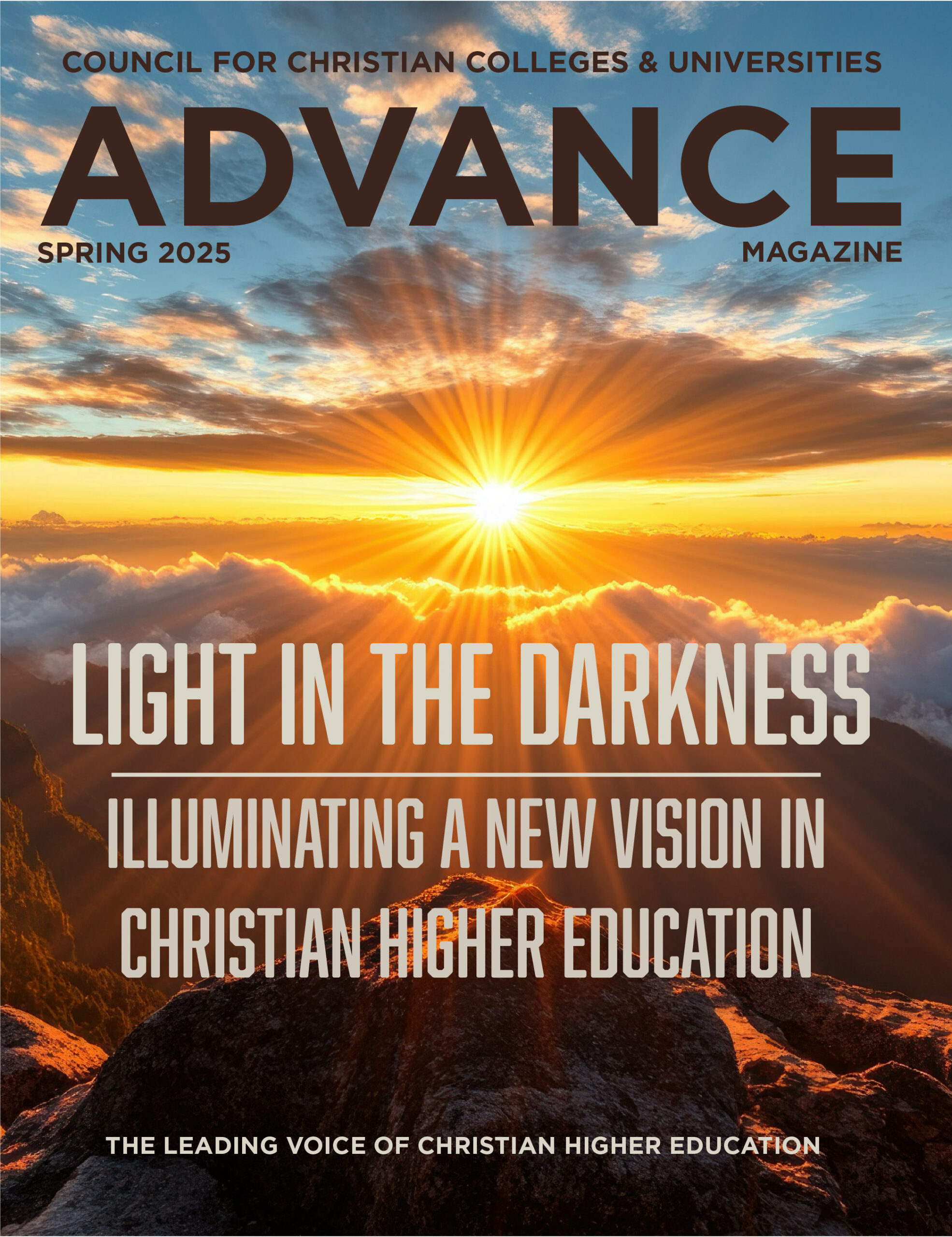Magazine
Sometimes the end is a good place to begin:
Faith believes God can. Hope believes God will. The issue on the Emmaus road is not faith. The issue is hope. Practicing the habits of hope requires faith, and as hope grows, faith deepens.
So writes Jon Kulaga in the conclusion of Habits of Hope: Educational Practices for a Weary World (IVP Academic, 2024). Edited by Todd Ream, Jerry Pattengale, and Christopher Devers, the book includes essays by experts in diverse fields of academia who dig beneath the pedagogy of their disciplines to offer conversation and tools to build a bedrock of hope for ourselves and our students—a sometimes elusive but always necessary foundation for thriving in life, and in higher education.
With Christian humanism as an assumed necessity, the writers in Habits of Hope tether the work of our present to the hope of our future. “When it comes to the cultivation of the virtue of hope,” say the editors, “our expectation of the end of time narrates how we live in the present.”
While humanism emphasizes human potential and reason, Christian humanism urges humanity to do their work and live into their potential—but anchors that potential in God, our creator. “Christian humanism not only occupies a history far more expansive than its secular alternative but can only be appreciated when theologically contextualized well,” the editors write.
This is where the contributors to Habits of Hope come in, surfacing acts and attitudes of hope within their disciplines. Individuals who devote their lives to higher education are inherently hopeful, choosing our work because we hope to shape individuals, communities, and even nations. But the journey is long and can be arduous. This book serves to remind us of what we know, while also turning the prism to catch the light differently and cast new colors.
The challenge for the Christian university, writes Kevin Grove (University of Notre Dame) in his essay on the hope of education, is to articulate “a vision of Christian hope true to the Gospels that does not close down inquiry, but enlivens it.” Do not settle for a hope that is too small, he says, when we have the great hope of eternal life with God. This “great hope” should not be an afterthought, but a “teleological grounding that can give life and light to the classroom, the laboratory, and the institutional mission.”
But how do we build hope into our classrooms, a hope that is ethos as well as words?
Philip Graham Ryken, president of Wheaton College, tackles this question at the administrative level, tracking the history of integrating faith and learning as far back as Rome in AD 540. He names the challenges and necessity of integrating faith and learning in today’s universities, providing examples and ideas from several schools.
David I. Smith (Calvin University) writes about teaching as a hopeful practice, warning against surrendering riskier hopes in favor of manageable routines. He urges us instead to let go of the “romantic” love for teaching and reach for an “enlarged love that extends beyond our own need to be heard.”
Cherie Harder, president of the Trinity Forum, discusses the dynamic of conversation, which she identifies as essential to both education and a well-lived life. The key, she says, is cultivating high-quality conversations that simultaneously spur deeper thinking and build meaningful connections between individuals. Conversations that become explorations “illuminate new possibilities and reflect the purpose of education—to form as well as inform, to provide a travel guide to the good life.”
Exploring the hopeful practice of diversity, Kimberly Battle-Walters Denu (Westmont College) says that Christian institutions have an obligation and a natural orientation to prepare students for meaningful engagement in a pluralistic world. Conflict, she says, is something to embrace, inviting us into deeper conversations and new understandings. This is the stuff of hope—a reminder of the transformative gospel, which reconciles us to God and invites us into “right relationship with God, others, and ourselves.”
Meanwhile, reading, says Hans Boersma (Nashotah House Theological Seminary), is an avenue of hope “because it is the practice through which we enter into the eternal Word of God.” Exploring Maximus the Confessor’s pedagogy, Boersma delights in the very words themselves, offering throughout his chapter the Latin and Greek in addition to English. But he emphasizes the necessity of reading well—“skillfully or virtuously”—the three “books” God gives us in Christ, creation, and Scripture—all intended by God to lead us back to Him.
When it comes to the hopeful act of writing, Jessica Hooten Wilson (Pepperdine University) points toward God’s command in Scripture for Moses and others to write. In addition to discussing the hope given to both the reader and the writer through the historical, prophetic, and poetic genres, she urges us to write for healing, to know ourselves, and for the journey itself: “We write with anticipation, in faith that the future will happen, and with hope that what we do in the present matters.”
Throughout Habits of Hope, the tone changes from chapter to chapter, ranging from conversational to academic. Some writers provide concrete examples and suggested tools for the classroom; others leave application to the reader.
Each chapter stands alone, so you might read only what applies directly to your field. Yet they all also intertwine, as do the disciplines of higher education. And while the individual can be challenged and encouraged, the book may best be used in community as a launching pad for discussion and brainstorming. Heavily footnoted, Habits of Hope offers rich resources for further study.
“Ultimately, the hope of Christian education is one that lets the promise of life in Christ inspire the flourishing of all other hopes,” Grove writes. Back on the Emmaus road, the two disciples, after realizing Jesus had been their traveling companion, said, “Didn’t our hearts burn?”—and they hurried to tell the other disciples. The writers of Habits of Hope want to stir the embers of our hearts as we invite students on the journey with Christ.
“Long after students forget the details of a particular topic offered on any given day,” write Ream, Pattengale, and Devers, “the manner in which the practice of teaching informed them about what it means to be human, what God may have called them to do with their lives, and to what end are they to exercise those callings will linger.”
Kimberly Felton has lived and worked in the Pacific Northwest for 30+ years, writing for international nonprofits such as Luis Palau Association and Medical Teams International. Her freelance writing has been published by George Fox University, Oregon State University, Christianity Today, and others.
__________
Do you know of a recent or upcoming book that is relevant to Christian higher education? Share your book review suggestions with us by sending an email to editor@cccu.org.




